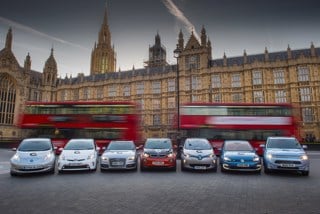If the Government is to stand a chance of achieving its Road to Zero pledge of half of all new cars being ultra-low emission by 2030, it must bring forward planned reductions in company car tax rates and provide guarantees it will stay low, the fleet industry has warned.
Company car drivers considering a pure electric or hybrid car face a three-percentage point increase in benefit-in-kind (BIK) tax rates from next April, before rates fall the following year.
The tax cut, from 16% to 2%, from April 2020 for pure electric vehicles (EVs) will save company car drivers hundreds of pounds a year. For a Nissan Leaf, for example, a 20% taxpayer would see their annual BIK bill fall from £1,051 to £131.
BIK rates for hybrid cars will also fall, bringing savings to thousands more company car drivers and incentivising uptake further.
On a Mitsubishi Outlander PHEV, for example, the annual tax bill will be cut by £150 thanks to its electric-only range of 28 miles (WLTP) putting it into a 14% BIK bracket.
The new regime, announced in November 2017, was designed to incentivise the cleanest cars, but now stands accused of holding back take-up.
By bringing forward the 2020 BIK reductions, the fleet industry argues the plug-in market could get a much-needed boost.
“At a time when the Government is desperate to encourage plug-in take-up among all drivers, but particularly fleets as they are the largest purchaser of new cars, then it is essential that a tax regime is in place that encourages that demand,” said John Pryor, the chairman of ACFO, the fleet representative body.
So far this year, 8,980 pure EVs have been registered, compared with 9,030 in the first eight months of 2018 – a fall of 0.6%.
However, when taken together with other ULEVs, Government figures show that 33,792 cars qualified for the plug-in-car grant during the same period, a 32.6% year-on-year increase.
Last year, 53,203 new ULEVs were registered in the UK, up 27% from 41,837 units in 2016. However, they accounted for just 1.7% of all new vehicle registrations – up from 1.2% one year previously and 0.9% two years before.
To achieve the Government’s ambition for at least half of new cars to be ULEVs (sub-50g/km CO2) by 2030, registrations would have to rise 30% year-on-year for the next 12 years.
Tusker CEO Paul Gilshan said: “ Chris Grayling said in July that the Road to Zero strategy ‘sets out a clear path for Britain to be a world leader in the zero-emission revolution – ensuring that the UK has cleaner air, a better environment and a stronger economy’.
“For the Government to stand a chance in achieving this, they need to support company car drivers with lower BIK rates for electric drivers, rather than increasing them next year.”
Like ACFO, Tusker wants the Chancellor of the Exchequer, Philip Hammond, to introduce the new rates a year early when he delivers his Budget in the House of Commons on Monday, October 29.
Gilshan said: “Tusker has seen a continued increase in ULEVs over the past few years, with 9% of new orders now a ULEV. If the ‘cliff-edge’ drop in BIK was brought forward, this growth would accelerate.”
Tusker has started a petition on the Government’s website calling for the Treasury to intervene, while Fleet News is urging the Chancellor to bring forward the BIK incentives to October’s Budget through the Fleet Budget Manifesto .
Produced in consultation with the British Vehicle Rental and Leasing Association (BVRLA) and ACFO, the manifesto calls on the Government to act on a range of fleet-related issues, alongside the changes to BIK.
They include: Raising ULEV incentives through a long-term commitment to grants; reconsidering the 4% diesel supplement; realigning BIK to take account of WLTP-based CO2; and committing to a longer-term (four-five years) view of BIK.
Fleets can sign up to the campaign at fleetnews.co.uk/fbm2018.
The BVRLA said the planned three-percentage-point increase in April for ULEVs is “actively disincentivising” the take-up of EVs as company cars and contradicting the ambitions set out in the Road to Zero strategy.
Gerry Keaney, the chief executive of the BVRLA, said: “By bringing forward the 2% company car tax rate for zero-emission vehicles, the Government would be sending the right market signal, stimulating the new and used electric vehicle market, while at the same time promoting the UK as a place for inward investment.
“Fiscal policy is a powerful and effective tool to achieve the Government’s environmental goals. In particular, there is great potential to use fiscal incentives to leverage the company car market, which is already a key enabler for the early adoption of new technologies.”
The BVRLA launched its Plug-in Pledge earlier this year, which called upon the Government to support greater uptake in electric and hybrid vehicles through measures such as bringing forward the plug-in company car tax incentives.
The pledge aims to see members’ combined plug-in vehicle fleet size go from 50,000 today to 720,000 by 2025. By that time, vehicle rental and leasing companies will be buying 300,000 plug-in vehicles a year, representing an increase in the industry’s share of annual new plug-in hybrid and pure EV registrations from 36% to 60%.
Mike Hawes, the chief executive of the Society of Motor Manufacturers & Traders (SMMT), said: “Industry supports a consistent, long-term approach to vehicle taxation policy to avoid market distortion and confusion.
“The automotive sector is firmly committed to a zero-emission future and is investing billions in technologies to get there, but this must be matched by government measures including technology-neutral incentives, investment into infrastructure and fiscal and other policy support to encourage uptake of alternative fuel vehicles.”
Meanwhile, leasing company Lex Autolease is independently incentivising the take-up of pure EVs by offering fleet decision makers £1,000 for each one they adopt (Fleet News, September 20).
The lump sum is available for the first 1,000 customers, whether corporate or private, who sign-up for a zero-emission vehicle from January.
Lex has 18,000 ultra-low and zero-emission vehicles on its fleet, including 1,000 pure EVs, but it believes the move will help it to double the size of its pure EV fleet.
Ashley Barnett, head of consultancy at Lex Autolease, said while the company car market represented fewer than one million cars out of the 31m on UK roads, renewing and replacing those cars played a vital role on the wider market.
He also believes it is easier to drive the adoption of ULEVs within the company car market, rather than through personal contract hire, for example, due to the way incentives are currently targeted.
Barnett said visibility of year-three and -four BIK tax rates, as well as a long-term view of the plug-in car grant, would also prove vital to driving the uptake of EVs, echoing the Fleet Budget Manifesto proposal.
The Government has committed to maintaining a plug-in vehicle grant in some form until 2020, but it is expected to announce changes to the scheme this month.
Barnett said: “I would like to see the £4,500 maintained. If anything has to be reduced, I think it should be on the hybrid side, because trying to get as many people into pure EVs as possible is absolutely the right way to go.
“If you buy or lease a valuable asset for a long duration – four or five years – you’d also like to know, with some degree of certainty, what you’re going to be paying without worrying that, part-way through, something out of your control is going to drastically impact that monthly cost. That’s where some of the hesitancy of company car drivers is coming from.”
The lack of rates beyond April 2021 was also a concern for Matt Dale, head of consultancy at ALD Automotive. “Once confirmed, this should give more confidence to company car drivers looking to switch into ULEVs,” he said.
Fleet News Fleet Budget Manifesto
The need to bring forward the 2020 BIK reductions for ultra-low emission cars is an issue raised in our Fleet Budget Manifesto.























Sage & Onion - 11/10/2018 14:26
What also has slowed the uptake in ULEV's is the Chancellors senseless decision to add the £310-£450 p.a. premium each year from year 2 on road tax for cars with a list price over £40k. Quite a few PHEV's from premium brands will easily exceed this when spec'd up but also most pure EV's will exceed this too. This will put off the private buyer, and will lead to these models becoming out of reach of drivers on restricted choice lists if their choice is based on WLC for example. This was a move I could never understand from The Chancellor because he had the opportunity to take gas guzzling executive drivers out of their gas guzzlers and into ULEV's. He should have had this premium RFL premium waived for ULEV's.